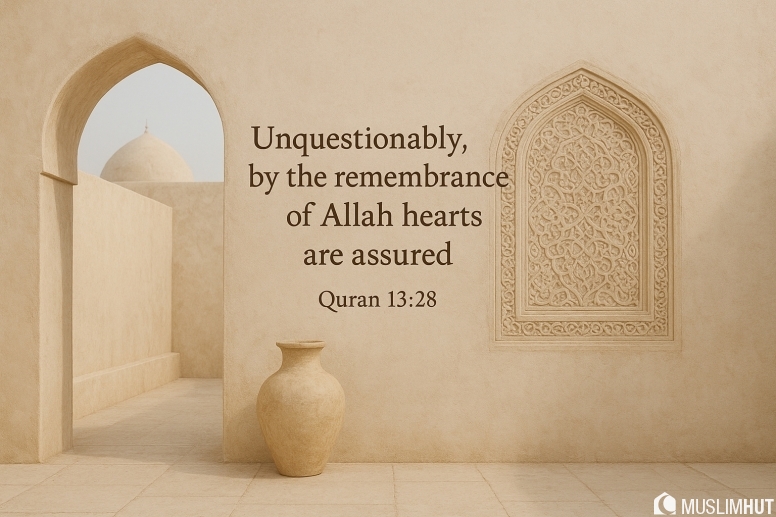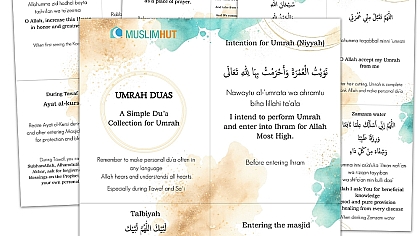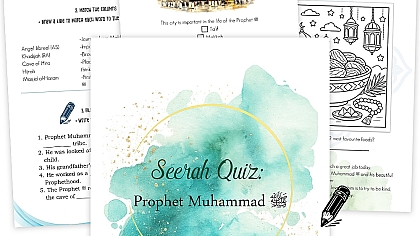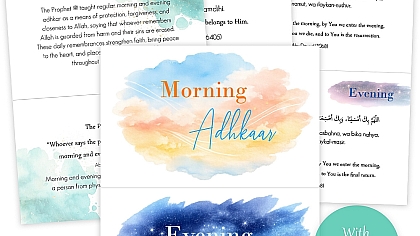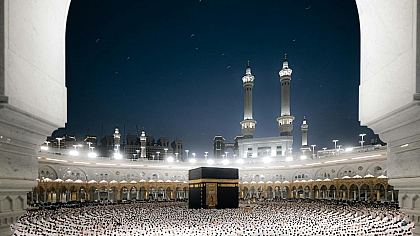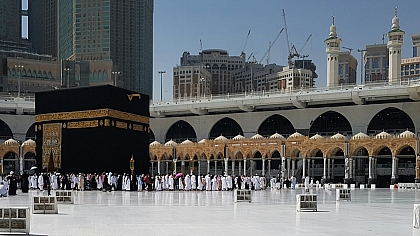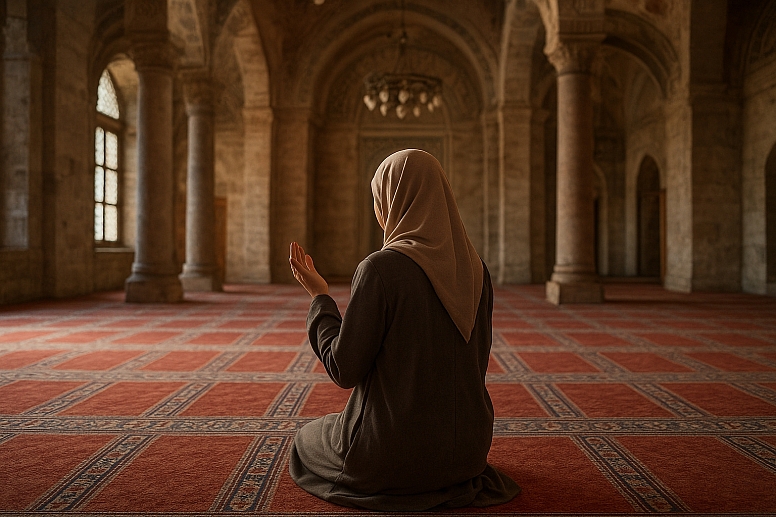
Islamic Mindfulness: How Dhikr and Salah Reduce Stress & Improve Mental Fitness
Your mind is busy. Thoughts about school, work, friends, and family swirl around all day. This can make you feel worried, stressed, or tired. Everyone looks for ways to feel calm. Some people try yoga or meditation. But did you know Islam has its own perfect form of mindfulness? It is built right into your daily life.
Two of the greatest tools for mental peace are Dhikr (remembering Allah) and Salah (prayer). These are not just rituals. They are God-given techniques to clean your mind and strengthen your heart.
Your Path to a Calmer Mind:
- Understand how Salah acts as a daily mental reset button.
- Learn the science behind why repeating Dhikr lowers stress.
- Discover practical steps to make your prayers more mindful.
- See how turning to Allah is the ultimate solution for anxiety.
What is Mindfulness? An Islamic Perspective
Mindfulness means living in the present moment. It is about focusing your mind on what you are doing right now. When you are eating, you just eat. You taste the food. You are not thinking about your homework. When you are walking, you just walk. You feel your feet on the ground. You are not worrying about tomorrow.
This might sound like a new idea, but it is very old in Islam. Muslims call this state Hudur al-Qalb – the presence of the heart. It is the opposite of a forgetful or scattered mind. The Quran warns against being absent-minded or heedless. Allah says:
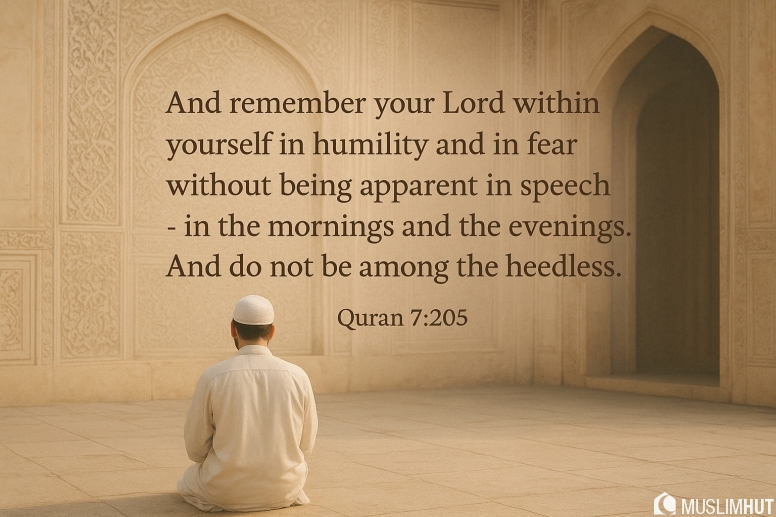
The goal of Islamic mindfulness is to focus your heart and mind entirely on Allah. You achieve this through two main practices: Salah and Dhikr.
Salah: The Five Daily Mental Resets
Think of your mind like a computer. If you have too many programs open, it gets hot, slow, and might crash. You need to restart it to make it work smoothly again. Salah is that daily restart for your mind and soul. It is a mandatory break from the world.
How Salah Trains Your Brain
The physical actions of Salah – standing, bowing, prostrating, sitting – are a form of moving meditation. Each part has a deep meaning.
- Takbir (Saying Allahu Akbar): You begin by raising your hands and saying “Allahu Akbar” (Allah is the Greatest). This is you mentally shutting the door on the world. You are telling your brain to let go of all other thoughts. Your boss, your exams, your chores – they are not the greatest. Allah is. This puts everything else into perspective and instantly lowers anxiety.
- Qiyam (Standing): You stand quietly, reciting verses from the Quran. This requires focus. Your mind might wander, but you gently bring it back to the words you are reading. This is a core mindfulness exercise: noticing a distraction and returning to your anchor (the Quran).
- Ruku (Bowing) and Sujood (Prostration): These are the most humble positions. Placing your forehead on the ground is the ultimate act of surrender. It is a physical reminder that you are not in control of everything; Allah is. Letting go of that need for control is a huge relief for a stressed mind. The Prophet Muhammad (Sallallahu Alaihi Wasallam) said: “The closest a servant is to his Lord is when he is in prostration.” (Sahih Muslim). In this state, you can pour out your worries and feel a real sense of connection and peace.
Salah forces you to stop five times a day. You cannot pray while rushing. It forces you to breathe, to focus, and to reconnect with your purpose. This regular break prevents stress from building up.
Dhikr: The Constant Anchor of the Heart
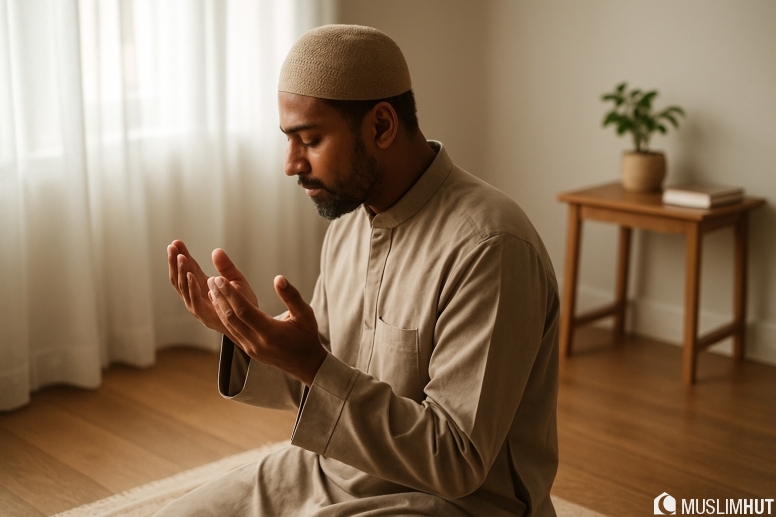
Dhikr means remembrance. It is the act of repeating specific phrases to keep your heart connected to Allah throughout the day. If Salah is your daily restart, Dhikr is the program that runs in the background, keeping everything stable.
The Science and Spirituality of Repetition
Repeating a calming phrase has a proven psychological effect. It slows your breathing, calms your heart rate, and focuses your mind. Now, imagine that phrase is one of the names of Allah.
- Subhanallah (Glory be to Allah): This phrase helps you appreciate the perfection of Allah’s creation. It takes your mind off flaws and problems.
- Alhamdulillah (All praise is for Allah): This is gratitude. Science proves that practising gratitude rewires your brain for happiness. Saying Alhamdulillah, even for small things, shifts your focus from what you lack to what you have.
- Allahu Akbar (Allah is the Greatest): This puts all your problems in their place. No problem is bigger than Allah. This phrase reduces fear and worry.
- La ilaha illallah (There is no god but Allah): This is the ultimate statement of focus. It reminds you that only Allah is worthy of your worship and your worries.
The Prophet (Sallallahu Alaihi Wasallam) said the best Dhikr is La ilaha illallah and the best supplication is Alhamdulillah. He also compared those who remember Allah to a living person among the dead.
Making Dhikr a Habit
You do not need a special time or place for Dhikr. You can do it anywhere:
- Say “Alhamdulillah” when you eat a good meal.
- Say “Subhanallah” when you see a beautiful sunset.
- Repeat your favourite phrases while driving, walking, or waiting in line.
- Use a misbaha (prayer beads) to keep count if it helps.
This turns everyday moments into opportunities for mindfulness and worship. It stops stress before it even starts.
Bringing It All Together: Practical Steps for Mindful Worship
Knowing the theory is one thing. Feeling the benefit is another. Here is how to make your practice more mindful.
For Salah:
- Understand what you are saying. Try to learn the meaning of Surah Al-Fatiha and the du’as you recite. It is hard to focus on words you do not understand.
- Slow down. Do not rush your prayer. Perform each movement with calmness and precision.
- Visualize. When you say “Allahu Akbar,” imagine you are closing a door on the world. In prostration, imagine you are placing your worries on the floor and leaving them there.
- Find a quiet space. Pray where you are less likely to be interrupted.
For Dhikr:
- Pick one phrase. Start with just one, like “Alhamdulillah.” Make a goal to say it 100 times a day.
- Set reminders. Use your phone alarm or associate Dhikr with a daily activity (e.g., every time I open a door, I will say “Bismillah”).
- Feel the words. Do not just say them with your tongue. Think about their meaning and let them sink into your heart.
Your Calm Mind is an Act of Worship
Taking care of your mental health is not separate from your faith. It is a part of it. Feeling stressed or anxious is human. But your deen gives you the tools to handle it. Allah did not create you to live in a state of constant worry.
Dhikr and Salah are your direct line to peace. They are not magical spells. They are disciplined practices that, when done with the presence of heart, reorient your entire perspective. They remind you of who you are, who your Lord is, and that this world is temporary. That realization is the deepest source of mental peace.
Your mind is a gift. Protect it. Choose one thing to practice today. Will you slow down your next Salah? Will you try to say “Alhamdulillah” ten more times than you did yesterday? Start small, but start now. Your path to a calmer, more focused mind is just one Takbir away.
Frequently Asked Questions
I try to focus on my prayer, but my mind always wanders. What should I do? This is completely normal. The Prophet (Sallallahu Alaihi Wasallam) taught that Shaytan comes to distract a person during prayer. The key is not to get frustrated. Gently acknowledge the thought and then let it go as you return your focus to the words of your prayer. Every time you bring your mind back, it is like a rep in a mental workout—you are getting stronger.
Are there specific Dhikrs for anxiety? Yes. The Prophet (Sallallahu Alaihi Wasallam) taught us specific supplications for worry and stress. One of the most comprehensive is to say: “Allahumma inni a’udhu bika minal-hammi wal-hazan…” (O Allah, I seek refuge in you from grief and anxiety…). Also, repeatedly seeking forgiveness (Astaghfirullah) is known to remove anxiety and open doors of provision.
How long until I feel the effects? It is different for everyone. Some people feel a sense of immediate calm after a mindful Salah. For deeper, lasting change, consistency is key. Make Dhikr and mindful Salah a daily habit, and you will likely notice a general shift in your baseline stress level over a few weeks.
Is this a replacement for professional therapy? No. Islam encourages us to seek knowledge and treatment. If you are experiencing severe anxiety or depression, these practices are a powerful spiritual support, but you should also seek help from a qualified medical professional or therapist. Consider it part of your holistic treatment—tending to both your spiritual and psychological needs.
Can I listen to Quran recitation for mindfulness? Absolutely. Listening to the Quran calmly and attentively is a form of worship and a fantastic way to calm the heart. Allah says:
